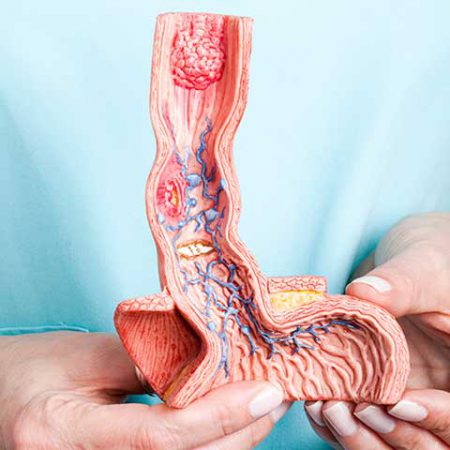
Two-and-a-half-year-old Yanki Leib Shetland had never eaten a carrot or a potato chip. He was subsisting on baby formula, chocolate milk, and porridge. It was no wonder he was so small and underdeveloped.
When his desperate parents brought Yanki to the pediatric gastroenterology department at Hadassah Hospital Ein Kerem, he managed to surprise even the experienced physicians. The toddler had a tenth-of-an-inch (2,5 mm) passage in his esophagus, nearly a complete blockage.
Miriam Shetland, his mother, relates that from the time she tried to introduce solid foods at about six months, Yanki had not been able to keep them down. Eventually, he refused to even try solids. His neighborhood doctors suggested therapy for an eating disorder as well as medications. Nothing worked.
A gastroscopy procedure at Hadassah, where a camera shows the esophagus and stomach in action, revealed Yanki’s nearly closed food passage. “We were astounded,” says senior gastroenterologist Dr. Mordechai Slae. “No solid food could get through to his stomach.”
After careful consideration, Dr. Slae explains, they began the usual treatment for this condition: balloon expansion of the esophagus. “But Yanki’s esophagus was so extremely narrow that it wouldn’t stretch,” relates Dr. Slae. “The next option was open-chest surgery, but children have a difficult recovery from this trauma to the body. We needed to take the quality of life into consideration. In short, we needed to find an option outside the box.”
The global trend for reaching problematic areas of the body is to use an endoscope, an illuminated, typically slender tubular instrument that allows the physician to look deep into the body while only subjecting the patient to minimally invasive surgery.
“My instinct was to explore endoscopic surgery,” explains Dr. Slae. “And I found, to my delight, a report in the literature of Boston Children’s Hospital of good results performing endoscopic surgeries in children. My next step was to turn to the prowess of Hadassah in endoscopic surgery. My colleague, Dr. Harold Jacob, a senior physician at the Institute of Gastroenterology and Liver Diseases and director of the endoscopic unit, has been doing extraordinary esophageal surgery using a method developed in Japan, where there are high rates of esophageal cancer. After gaining permission from the parents, we developed our method based on the Boston operation, using the tiniest tools to sever the tissues that caused the narrowing of the esophagus.
In recent years, Dr. Jacob reports, Hadassah has been investing in endoscopic surgery. “Now more than ever,” he says, “it can be said that the investment has paid off. Thanks to our extensive experience in endoscopic surgery, we had the technique to treat Yanki’s blockage and enable him to eat like any other child his age, without causing him the suffering that comes with ordinary surgery. I am very pleased and excited by the results.”
Dr. Slae adds, “We really see it as a revolution, a solution that can improve the quality of life for many children.”
Two days after surgery, Yanki’s parents were able to take him home. For the first time, their son ate a slice of bread. Yanki’s mother describes a whole new life for her son. “Today my son eats bread, chicken, fruit, and vegetables. For all mothers, this seems natural and obvious, but for me, it’s huge. Hadassah’s doctors saved our son and changed my life and my family’s as well. They treated my son as if he were the most important patient on earth. Who could have guessed that watching your child eat a sandwich would be such a joy?”
